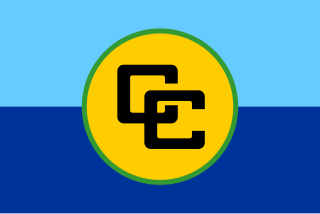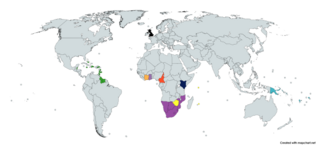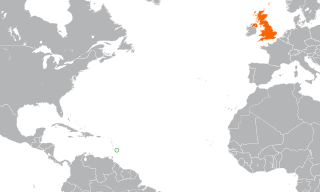 | |
Saint Vincent and the Grenadines | United Kingdom |
|---|---|

Saint Vincent and the Grenadines and the United Kingdom have a long history, tracing back to early British settlements and British conflicts with the French during the Colonial era.
 | |
Saint Vincent and the Grenadines | United Kingdom |
|---|---|

Saint Vincent and the Grenadines and the United Kingdom have a long history, tracing back to early British settlements and British conflicts with the French during the Colonial era.
Control of the island of Saint Vincent was ceded to Britain by the French following the signing of the Treaty of Paris in 1763. The French recaptured the island but ceded it again after the second Treaty of Paris in 1783. [1]
The British began a program of agricultural development and established plantations across the island; a program opposed by local Black Caribs. [ citation needed ]
Saint Vincent remained under British colonial rule. After independence movements began in the 20th century, Saint Vincent (with the neighboring smaller islands) was granted "associate statehood" status by Britain on 27 October 1969. This gave Saint Vincent complete control over its internal affairs but was short of full independence. On 27 October 1979, following a referendum under Milton Cato, Saint Vincent and the Grenadines became the last of the Windward Islands associated states to gain independence. Independence came on the 10th anniversary of Saint Vincent's associate statehood status. [2]
Saint Vincent and the Grenadines maintains a High Commission in South Kensington in London and a consulate-general in Comber, Northern Ireland. [3] In turn, the United Kingdom maintains a High Commission in Kingstown.
From December 2008 until 30 December 2020, trade between Saint Vincent and the UK was governed by the CARIFORUM–European Union Economic Partnership Agreement. [4] Following the withdrawal of the United Kingdom from the European Union, the UK and the CARIFORUM states signed a continuity trade agreement based on the EU agreement; this agreement has governed Saint Vincent and the Grenadines–UK trade since 1 January 2021. [5] [6]

Saint Vincent and the Grenadines is an island country in the eastern Caribbean. It is located in the southeast Windward Islands of the Lesser Antilles, which lie in the West Indies, at the southern end of the eastern border of the Caribbean Sea, where the latter meets the Atlantic Ocean.

The indigenous inhabitants of the islands of St. Vincent and the Grenadines were various Amerindian groups. The arrivals of Europeans in the early 16th century did not lead to long term settlement, only in 1717 did the French occupy the island in Barrouallie, though the English laid claim on St. Vincent in 1627. The Treaty of Paris (1763) saw St. Vincent ceded to Britain. Frictions with the British led to the First and Second Carib War in the mid- to late-18th century but the British held on to the islands. A Crown Colony government was installed in 1877, a Legislative Council created in 1925, and universal adult suffrage granted in 1951. Following a referendum in 1979, St. Vincent and the Grenadines became the last of the Windward Islands to gain independence on 27 October 1979.
Saint Vincent and the Grenadines maintains close ties to the US, Canada, and the United Kingdom, and cooperates with regional political and economic organizations such as the Organisation of Eastern Caribbean States (OECS) and CARICOM. St. Vincent and the Grenadines is a member of the United Nations, the Commonwealth of Nations, the Organization of American States, and the Association of Caribbean States (ACS). Saint Vincent is also the smallest nation ever to be on the United Nations Security Council.

The Caribbean Community is an intergovernmental organisation that is a political and economic union of 15 member states and five associated members throughout the Americas, The Caribbean and Atlantic Ocean. It has the primary objective to promote economic integration and cooperation among its members, ensure that the benefits of integration are equitably shared, and coordinate foreign policy. The organisation was established in 1973, by its four founding members signing the Treaty of Chaguaramas. Its primary activities involve:

Saint Vincent is a volcanic island in the Caribbean. It is the largest island of the country Saint Vincent and the Grenadines and is located in the Caribbean Sea, between Saint Lucia and Grenada. It is composed of partially submerged volcanic mountains. Its largest volcano and the country's highest peak, La Soufrière, is active, with the latest episode of volcanic activity having begun in December 2020 and intensifying in April 2021.

The special territories of members of the European Economic Area (EEA) are the 32 special territories of EU member states and EFTA member states which, for historical, geographical, or political reasons, enjoy special status within or outside the European Union and the European Free Trade Association.

Economic Partnership Agreements (EPAs) are a scheme to create a free trade area (FTA) between the European Union and other countries. They are a response to continuing criticism that the non-reciprocal and discriminating preferential trade agreements offered by the EU are incompatible with WTO rules. The EPAs date back to the signing of the Cotonou Agreement. The EPAs with the different regions are at different states of play. The EU has signed EPAs with the following countries: the Southern African Development Community (SADC), ECOWAS, six countries in Eastern and Southern Africa, Cameroon, four Pacific states, and the CARIFORUM states. Their defining characteristic is that they open up exports to the EU immediately, while exports to the partner regions is opened up only partially and over transitioning periods.

Foreign relations between Cyprus and the United Kingdom are positive. Cyprus gained its independence from the United Kingdom in 1960, after 82 years of British control; the two countries now enjoy warm relations, though the continuing British sovereignty of Akrotiri and Dhekelia in Cyprus continues to divide Cypriots. The countries are both members of the United Nations and Commonwealth of Nations.

Saint Vincent and the Grenadines – United States relations are bilateral relations between Saint Vincent and the Grenadines and the United States.

The monarchy of Saint Vincent and the Grenadines is a system of government in which a hereditary monarch is the sovereign and head of state of Saint Vincent and the Grenadines. The current Vincentian monarch and head of state, since 8 September 2022, is King Charles III. As sovereign, he is the personal embodiment of the Vincentian Crown. Although the person of the sovereign is equally shared with 14 other independent countries within the Commonwealth of Nations, each country's monarchy is separate and legally distinct. As a result, the current monarch is officially titled King of Saint Vincent and the Grenadines and, in this capacity, he and other members of the royal family undertake public and private functions domestically and abroad as representatives of Saint Vincent and the Grenadines. However, the King is the only member of the royal family with any constitutional role.

This article deals with the diplomatic affairs, foreign policy and international relations of Barbados.

The historical ties between the governments of Barbados and the United Kingdom of Great Britain and Northern Ireland (UK) are long and complex, including settlement, post-colonialism and modern bilateral relations. The two countries are related through common history spanning 339 years (1627–1966). Since the Barbadian date of political independence, these nations continue to share ties through the Commonwealth of Nations. Until becoming a Commonwealth republic in 2021, Barbados also shared the same Head of State, with Queen Elizabeth II as their Monarch.

This is a timeline of the territorial evolution of the Caribbean and nearby areas of North, Central, and South America, listing each change to the internal and external borders of the various countries that make up the region.

Namibia–United Kingdom relations are the bilateral relations between Namibia and the United Kingdom. Both nations are members of the Commonwealth of Nations and the United Nations.

The head of state of both Belize and the United Kingdom is Charles III, who holds the title King of Belize. Both nations are members of the Commonwealth of Nations and the United Nations.

Following its withdrawal from the European Union on 31 January 2020, the United Kingdom began negotiations on several free trade agreements to remove or reduce tariff and non-tariff barriers to trade, both to establish new agreements and to replace previous EU trade agreements. Withdrawal ended 47 years of membership during which all its trading agreements were negotiated by the European Commission on behalf of the bloc. The UK did not actually withdraw from the European Single Market and the European Union Customs Union until 31 December 2020.
Vincentian nationality law is regulated by the Saint Vincent Constitution Order of 1979, as amended; the Saint Vincent and the Grenadines Citizenship Act of 1984, and its revisions; and various British Nationality laws. These laws determine who is, or is eligible to be, a national of Saint Vincent and the Grenadines. Vincentian nationality is typically obtained either on the principle of jus soli, i.e. by birth in Saint Vincent and the Grenadines; or under the rules of jus sanguinis, i.e. by birth abroad to parents with Vincentian nationality. It can be granted to persons with an affiliation to the country, or to a permanent resident who has lived in the country for a given period of time through naturalisation. There is not currently a program in Saint Vincent and the Grenadines for persons to acquire nationality through investment in the country. Nationality establishes one's international identity as a member of a sovereign nation. Though it is not synonymous with citizenship, for rights granted under domestic law for domestic purposes, the United Kingdom, and thus the commonwealth, have traditionally used the words interchangeably.

Antigua and Barbuda and the United Kingdom of Great Britain and Northern Ireland (UK) are related through a long common history spanning from 1632 for Antigua, and 1678 for the smaller sister-isle of Barbuda through until 1981 for the joint-state. Antigua was one of the oldest English settlements in the West Indies, and served as a British hub of regional administration for the surrounding Leeward Islands.